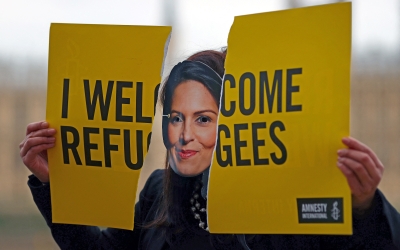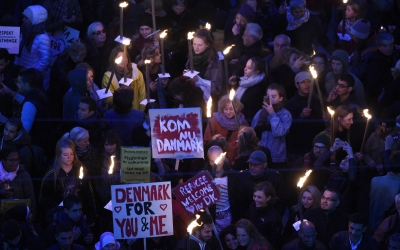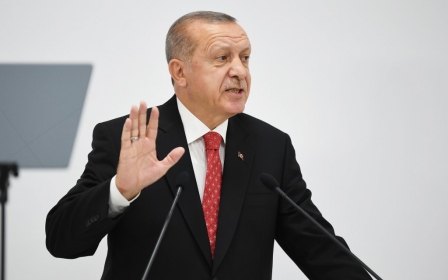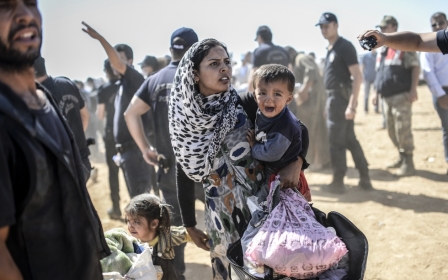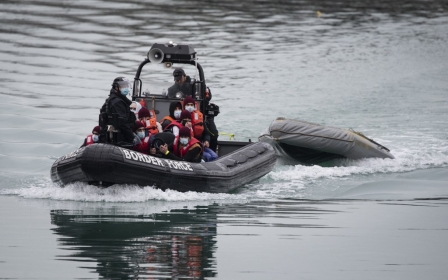UK: Campaigners deplore 'horrifying' Home Office stance on return of Syrian refugee

Human rights campaigners have criticised the UK Home Office after it told an asylum seeker he could return to Syria safely, despite the possible risks to his life after fleeing military conscription.
The Home Office's stance risks setting a new precedent, campaigners told Middle East Eye, warning that Syria is not safe to return to.
"It beggars belief that the Home Office is declaring Syria to be a safe country,” Mariam Kemple-Hardy, Head of Campaigns at Refugee Action, told Middle East Eye.
“Frankly, if this government is no longer granting sanctuary to Syrian refugees, who will it grant sanctuary to?” Kemple-Hardy said via email.
Kemple-Hardy called on the court to overturn the decision, saying it does not meet the “bare minimum anyone would expect of a government claiming to uphold its obligations on the world stage.”
In a letter seen by the Guardian, a Home Office official wrote to a 25-year-old asylum seeker from Syria that “I am not satisfied to a reasonable degree of likelihood that you have a well-founded fear of persecution.”
The letter, reported on Sunday, continued: “It is not accepted that you will face a risk of persecution or real risk of serious harm on return to the Syrian Arab Republic due to your imputed political opinion as a draft evader.”
According to a report from Human Rights Watch last year, Syrian refugees who had voluntarily returned to Syria between 2017 to 2021 from Lebanon and Jordan had “faced grave human rights abuses and persecution at the hands of the Syrian government and affiliated militias, including torture, extra-judicial killings, and kidnappings.”
The report found that one of the main reasons people have left is military evasion and is also why they cannot return.
'Threat of grave abuses'
Nadia Hardman, a researcher in the Refugee and Migrants division at HRW who wrote the report, told MEE that the Home Office’s decision is “just horrifying”.
Hardman explains that the idea to “parcel out” which refugees get to stay and which are safe to return cannot be done as long as there is no evidence of safety.
“Any government attempting to do that, either by virtue of a profile or a region, for example, Denmark has designated Damascus and the Damascus countryside area completely [safe], flies in the face of the evidence that we have,” Hardman said.
In March 2021, Denmark became the first European country to revoke residency permits from Syrian refugees after claiming that Damascus and its surrounding areas are now safe enough to return to.
The Home Office stance, Hardman fears, could have a knock-on effect on non-European countries, such as Turkey and Lebanon, which currently host millions of refugees.
“This is what was said to me all the time in meetings, with governments in the region. If Denmark can do this, why can’t we?” Hardman said.
“Just because people want to start talking about normalisation with Assad because trade deals have to be pushed through that doesn’t change the threat of grave abuses and persecutions of people when they return,” she added.
In a 2021 report on Syria, HRW said that while levels of violence have reduced in the war-torn country, more than 11.1 million people still require humanitarian aid
“A decade of war beset by violations, including crimes against humanity, has decimated the country’s infrastructure, with homes and schools destroyed, lack of clean water and sanitation, and most of the population unable to make ends meet,” HRW said.
Since the uprising in 2011 against the government, the Syrian conflict has resulted in the deaths of 350,00 people.
According to the UN, more than 6.6 million Syrians have been forced to flee since 2011 and another 6.7 million people remain internally displaced,
Since then, the Syrian government has been accused of human rights violations, including detentions and the use of prohibited weapons.
Middle East Eye propose une couverture et une analyse indépendantes et incomparables du Moyen-Orient, de l’Afrique du Nord et d’autres régions du monde. Pour en savoir plus sur la reprise de ce contenu et les frais qui s’appliquent, veuillez remplir ce formulaire [en anglais]. Pour en savoir plus sur MEE, cliquez ici [en anglais].


